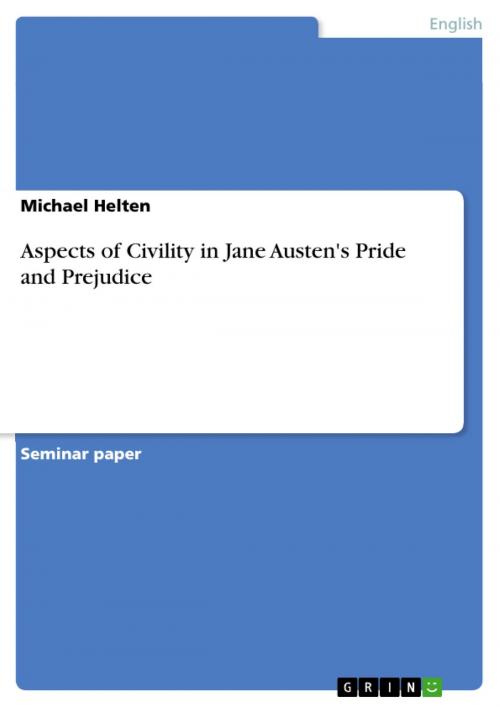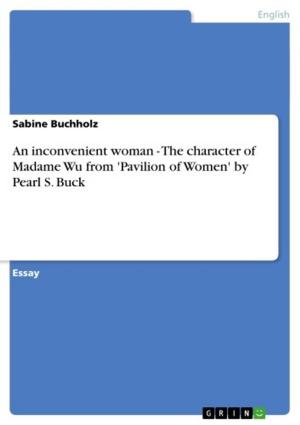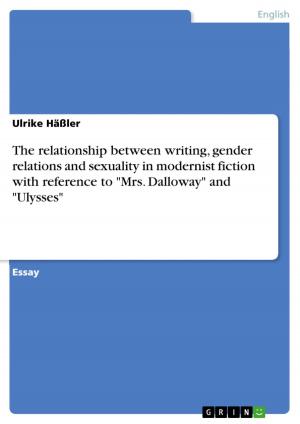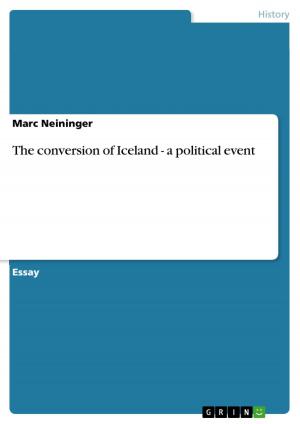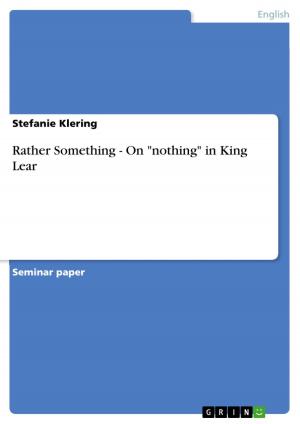Aspects of Civility in Jane Austen's Pride and Prejudice
Fiction & Literature, Literary Theory & Criticism, British| Author: | Michael Helten | ISBN: | 9783638515009 |
| Publisher: | GRIN Publishing | Publication: | June 29, 2006 |
| Imprint: | GRIN Publishing | Language: | English |
| Author: | Michael Helten |
| ISBN: | 9783638515009 |
| Publisher: | GRIN Publishing |
| Publication: | June 29, 2006 |
| Imprint: | GRIN Publishing |
| Language: | English |
Seminar paper from the year 2004 in the subject English Language and Literature Studies - Literature, grade: 1,0, University of Tubingen, course: Proseminar II: Jane Austen, 13 entries in the bibliography, language: English, abstract: Decisive parts of both plot and meaning of Jane Austen's Pride and Prejudice are conveyed by means of conversations. 'In them the word becomes an authentic deed', as H. BABB puts it. In linguistic terms, conversation is discourse - and discourse is necessarily social discourse. Taking into consideration that Jane Austen's age 'was an age of society's predominance, when man was viewed primarily as a social creature', and that ''ways of putting things', or simply language usage, are part of the very stuff that social relationships are made of', it is not hard to realize how much importance lies in the way the characters in Pride and Prejudice express themselves. Therefore, when he focuses on the various linguistic aspects of civility in Pride and Prejudice, the reader can throw light on the novel from a different angle. Civility is derived from the Latin word 'civilis', meaning 'of or pertaining to citizens'. According to the Oxford English Dictionary, it is 'behaviour proper to the intercourse of civilized people; ordinary courtesy or politeness, as opposed to rudeness of behaviour; decent respect, consideration'. J. HARRIS notices that Jane Austen 'explores [Richardson's] important word civil', without giving her finding consequence enough to go into much detail. However, when the word root civil itself occurs 'over seventy times in the novel', seventyeight times to be precise (while occurring only forty times in Sense and Sensibility, for example), and words closely related to civility appear in over one-hundred-and-fifty instances in the course of the novel, it becomes clear that the aspects of civility deserve a closer look. Because the social scheme has changed significantly since the time Jane Austen wrote her novels, the vocabulary related to civility has undergone some significant changes as well. The gaps in meaning between politeness, civility and gentleness have been diminished or have ceased to exist altogether in some speakers' vocabulary. The aim of this paper is therefore to pinpoint the different notions of civility and words related with civility as they are employed by Jane Austen in Pride and Prejudice. In the course, most attention will be paid to Mr Collins, a character who miraculously manages to be an epitome of both politeness and rudeness.
Seminar paper from the year 2004 in the subject English Language and Literature Studies - Literature, grade: 1,0, University of Tubingen, course: Proseminar II: Jane Austen, 13 entries in the bibliography, language: English, abstract: Decisive parts of both plot and meaning of Jane Austen's Pride and Prejudice are conveyed by means of conversations. 'In them the word becomes an authentic deed', as H. BABB puts it. In linguistic terms, conversation is discourse - and discourse is necessarily social discourse. Taking into consideration that Jane Austen's age 'was an age of society's predominance, when man was viewed primarily as a social creature', and that ''ways of putting things', or simply language usage, are part of the very stuff that social relationships are made of', it is not hard to realize how much importance lies in the way the characters in Pride and Prejudice express themselves. Therefore, when he focuses on the various linguistic aspects of civility in Pride and Prejudice, the reader can throw light on the novel from a different angle. Civility is derived from the Latin word 'civilis', meaning 'of or pertaining to citizens'. According to the Oxford English Dictionary, it is 'behaviour proper to the intercourse of civilized people; ordinary courtesy or politeness, as opposed to rudeness of behaviour; decent respect, consideration'. J. HARRIS notices that Jane Austen 'explores [Richardson's] important word civil', without giving her finding consequence enough to go into much detail. However, when the word root civil itself occurs 'over seventy times in the novel', seventyeight times to be precise (while occurring only forty times in Sense and Sensibility, for example), and words closely related to civility appear in over one-hundred-and-fifty instances in the course of the novel, it becomes clear that the aspects of civility deserve a closer look. Because the social scheme has changed significantly since the time Jane Austen wrote her novels, the vocabulary related to civility has undergone some significant changes as well. The gaps in meaning between politeness, civility and gentleness have been diminished or have ceased to exist altogether in some speakers' vocabulary. The aim of this paper is therefore to pinpoint the different notions of civility and words related with civility as they are employed by Jane Austen in Pride and Prejudice. In the course, most attention will be paid to Mr Collins, a character who miraculously manages to be an epitome of both politeness and rudeness.
